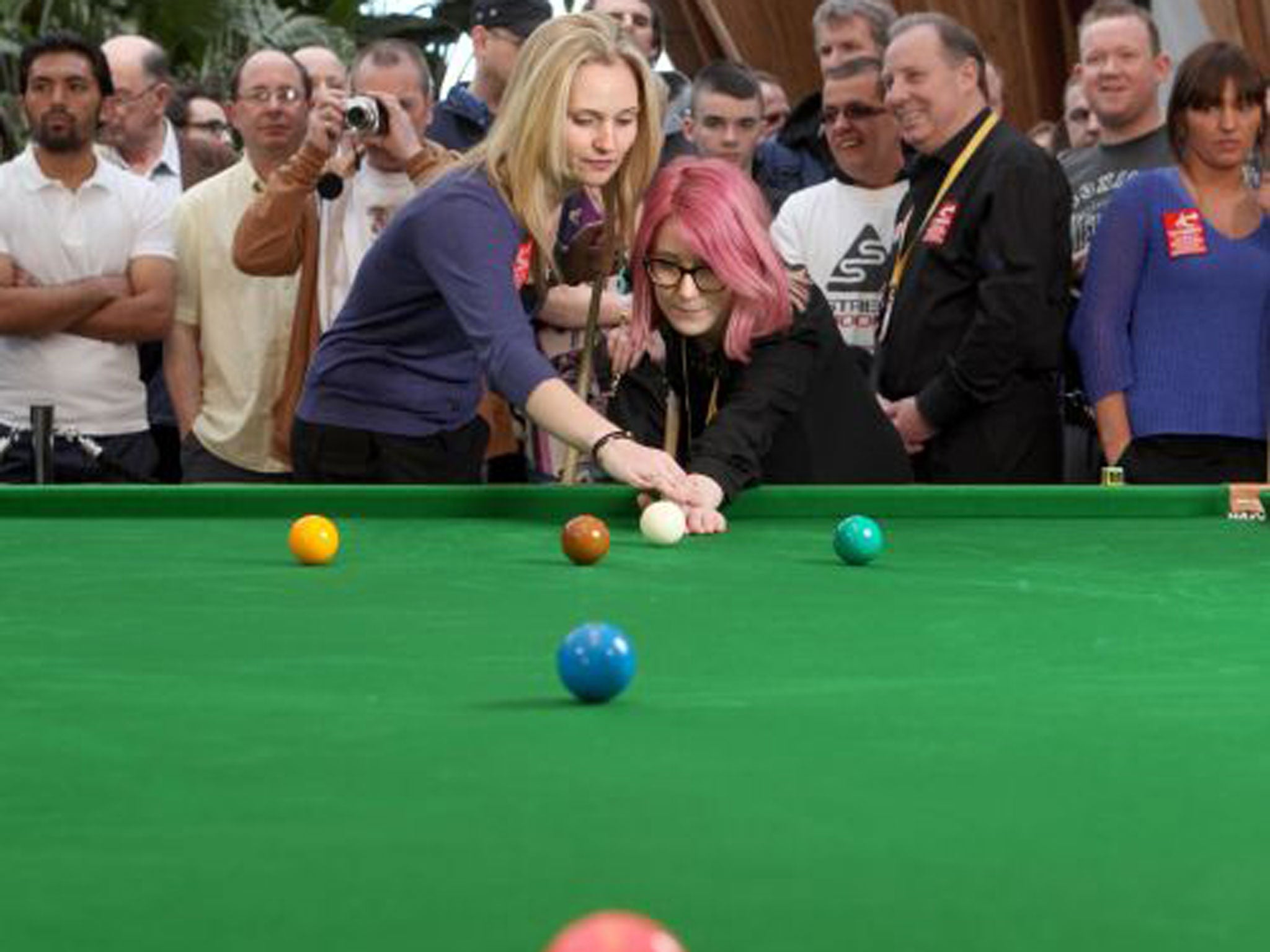Ladies' snooker: the new maidens of the green baize
It's big in the Far East, but it still has a long way to go here. Chloe Hamilton went to Sheffield to meet some potting pioneers...

Cue sports like snooker and pool are commonly associated with beer swilling, peanut crunching, pub dwelling men. As Michaela Tabb, who is herself a professional snooker and pool referee, puts it: “It was always the gentlemen who went into the billiard room while the ladies went and drank cups of tea.”
But yesterday marked the very first Ladies Day at the World Snooker Championship in Sheffield’s Crucible, with world-class female players taking to the arena to prove they are just as talented as the men. They even invited me to join in, despite having never played the game before.
Crouching down, chalked cue in hand, heart racing, my eyes fixed on the red ball ahead of me, it was hard not to feel intimidated. Yet much to my relief the ball slips into the pocket, disappearing with a reassuring thunk. Unfortunately, my moment of glory was short lived and I failed to pot anything in the next few shots.
Deciding to chalk this one up to experience, I retreated to the sidelines and watched while nine-time world champion Reanne Evans, 27, took over, effortlessly potting the coloured balls while the crowd clapped politely.
Reanne was introduced to the sport by her brother. “One day I just picked up his cue. It came naturally to me,” she says. “I play against the men to try to convince women that its alright for them to play this game. And obviously I want to beat them!”
It was at The Crucible that the famous 1985 black-ball final between Steve Davis and Dennis Taylor was played out into the early hours of a Monday morning, watched by a record television audience of 18.5 million. There can be little doubt that the vast majority of those late-night viewers were men – almost since it was invented snooker’s green baize has been a largely male domain.
The sport is popular with women in Thailand and China. But although snooker is long past its mid-Eighties zenith, and female participation is growing, there are still fewer female British players than male. So why are British women not as keen to get involved in this ball game?
“There are still clubs and pubs out there that don’t let women play snooker,” says Reanne. “With that attitude, no wonder women don’t want to play.” Women players are also required to wear the same waistcoat and a bow tie as the men, which Reanne thinks might put them off.
“I think that definitely needs to change. Then it will attract more lady players,” she says. “Who knows, we might win a few more matches if we had a skirt on!”
The World Professional Billiards and Snooker Association (WPBSA) needs more female players if it wants to fulfil its aspirations of making snooker an Olympic sport. One way they are doing this is by introducing it to children at school.
“I feel there’s been a lack of opportunity for girls to play snooker over the years,” says WPBSA chairman Jason Ferguson. “If we can introduce our sport to both men and women at a young age, we’ll see an increase in girls who continue to play.”
Ms Tabb, who now referees snooker matches, began playing pool professionally when she was 23. She was contacted in 2001 by World Snooker, which was seeking to change the profile of referees. “They wanted some younger ones, some international ones and some lady ones,” she says.
There’s no denying that there’s still a long way to go before the men’s and women’s games are equal. Yesterday, the ladies were separated from the “real” championship, where the men were playing. Their table was set up in the city’s Winter Garden, a shopping centre-cum-glasshouse, and the female players were gawped at by passers-by who seemed to enjoy the novelty.
One man winked at his friend and muttered: “These ladies are certainly drawing in the crowds.” If that’s the attitude of spectators, the sport would appear to have a long way to go.
In the frame: Three British women leading the way
Maria Catalano, 31, from Dudley, west Midlands, is currently ranked world No 1. She won the British Open in 2008 and is the cousin of the current men’s World Snooker Champion, Ronnie O’Sullivan.
Emma Bonney, 36, from Portsmouth, Hampshire, is the world’s No 2 and has won the World Ladies Billiards Championship seven times.
Reanne Evans, 27, also from Dudley, is the world No 3 and the reigning World Ladies Billiards and Snooker Champion. She won her ninth consecutive title earlier this month.
Join our commenting forum
Join thought-provoking conversations, follow other Independent readers and see their replies
Comments
Bookmark popover
Removed from bookmarks